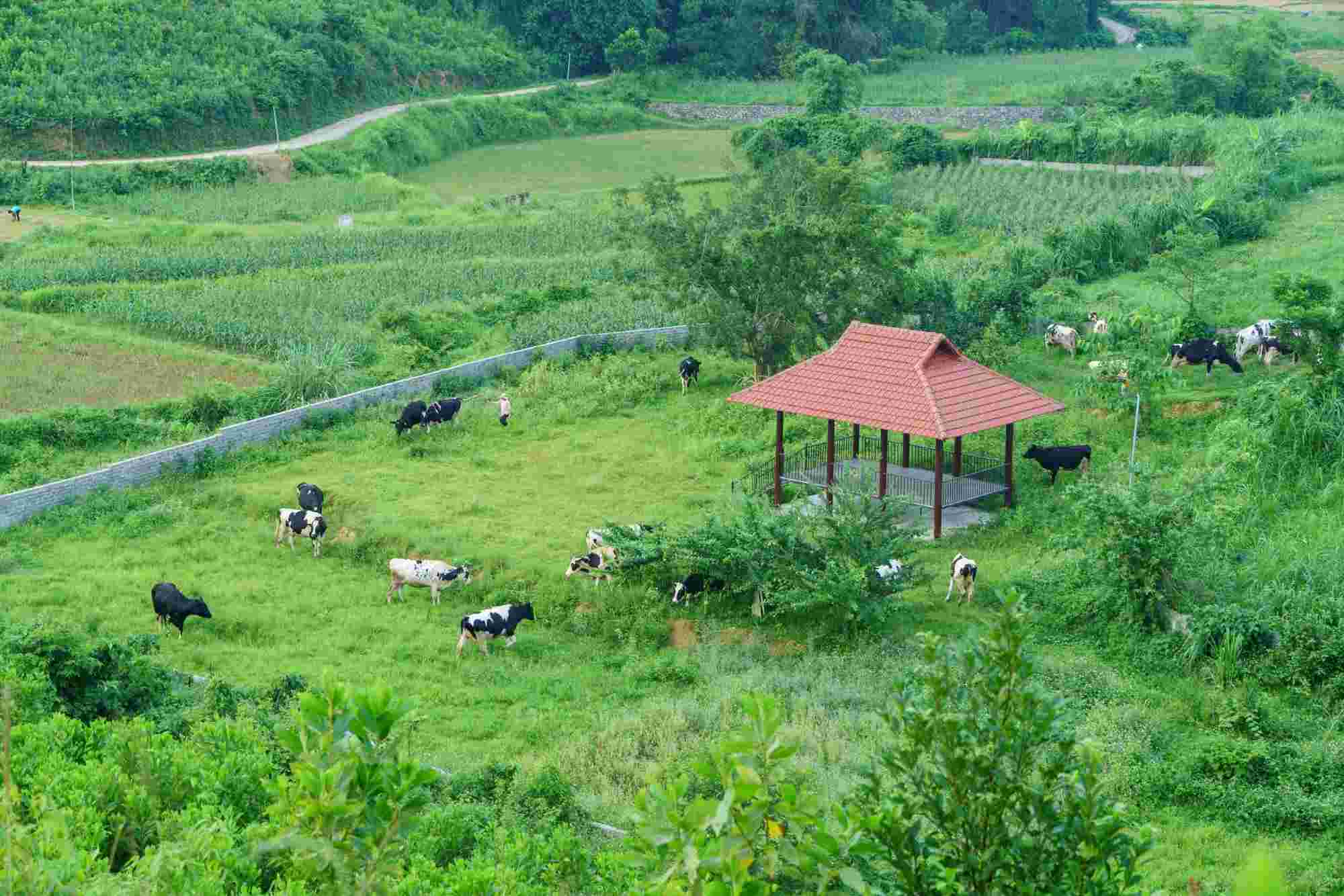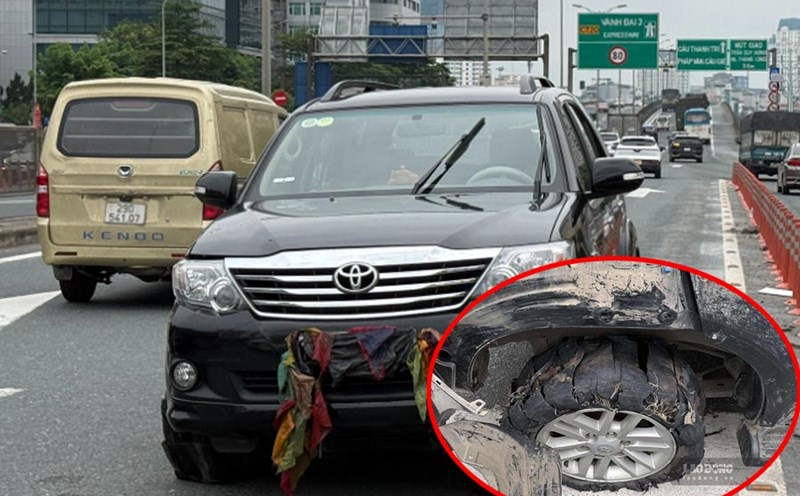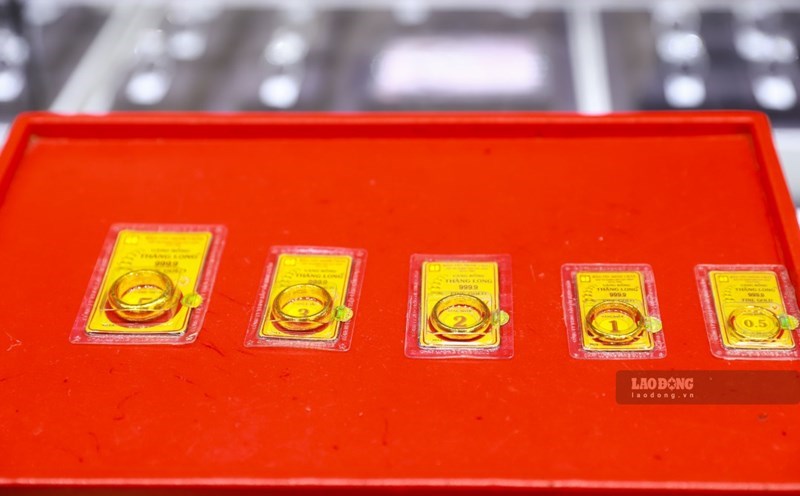Although that road is bumpy, arduous and has many failures, it has marked the steadfast spirit of modern farmers - those who tirelessly strive for a green, sustainable era.
Green dream from mother's worries
From the mother's dream, from the concern about finding a safe food source for her children, Ms. Nguyen Thi Thinh, CEO of Cach Dong Organic, was not afraid to change. From a farmer attached to her herd, she decided to embark on a new journey: Building an organic agricultural model that meets international standards.
Starting out as a cattle farm in Trac Van commune, Ha Nam (now Duy Tien ward, Ninh Binh province), with 13 mother cows producing dozens of tons of milk per year, but with the desire to change the production method, Ms. Thinh decided to relocate the breeding area from Ha Nam to Hoa Binh, a turning point decision.
In order to expand the area, create ideal breeding conditions and reduce capital needs, Ms. Thinh has sought a new land - where the herd is raised according to the 5-no" philosophy: no industrial crab, no genetically modified feed, no dairy growth stimulants, no preservatives, no antibiotic resistance.
From that determination, the Kech Dong milk product has achieved JAS certification - strict organic agricultural standards of Japan, requiring businesses to strictly control the closed process from cultivation - animal husbandry - processing - distribution.
Not only meeting international standards, Ms. Thinh also sets a special requirement: "Every milk product must have a happy flavor". Sharing about her own flavor, Ms. Nguyen Thi Thinh expressed: "The first thing has to come from the herd. The herd is raised in the environment closest to the most natural practice, that is, dairy cows are not kept in captivity, free to roam freely, eat organic food, live in a clean environment and are not forced to produce milk".
After more than 10 years of perseverance, Cach Dong has shaped the model of "circular livestock farming - regenerated agriculture". Livestock waste is turned into microbiota, regenerating grass fields to nourish, restore soil, solar energy to replace grid electricity and plant materials to limit the discharge of chemicals into the environment.

Greeen hoa from banana stems
If Ms. Thinh's journey started with organic cow's milk, then the story of Mr. Bui Khanh Dung - Director of Musa Pacta LLC - opened with... banana stems. He confidently affirmed: "We have never had to change, Musa Pacta has not done anything that is not green but needs to change to green".
At first, it seemed simple: Turning the life cycle of bananas into bags, baskets, carpets, lanterns, tables and chairs. But in reality, to make the product accepted and exported to the EU, Korea, Taiwan (China), Mr. Dung had to trade a lot of effort, time, money and will with the principle of "closed - circular - no waste".
When I visited Musa Pacta's showroom, I was surprised from one surprise to another when every small item in the room was started from the ingredients that seemed to be thrown away... the banana stems.
Explaining the reason for choosing banana stems as the input material for his products, Mr. Dung said that if we consider banana stems as an ingredient, we have the amount of ingredients calculated in units of tens of millions of tons per year. Meanwhile, banana stems are the 0 VND ingredient. And not everyone knows that each banana tree only bears fruit once in their life. After harvesting, the mother trees are often cut down to make room for young shoots to grow.
"I think that there is no activity or production sector that has tens of millions of tons of raw materials a year for free like that. With more than 160,000 hectares of banana cultivation now, we are wasting 20-30 million tons of banana stems/year" - Mr. Dung emphasized.
According to Mr. Dung, banana stem is an organic treasure, a treasure of micronutrients, a treasure of precious growth regulators such as: Auxin, Cytokinin, GA3 in large concentrations.
Talking about the potential of ingredients that are unintentionally considered a thing to be thrown away, Mr. Dung shared: "After the banana stems are collected, packed, separated and put into a fiber press, the dry banana fibers can earn hundreds of millions of USD and if they become fabric, the banana stems will bring in tens of billions of USD. Banana starch is used as a fertilizer for crops, providing micronutrients, which can help increase output and size".
When describing his small house, Mr. Dung mentioned his ideologist: Vietnam has 34 provinces and cities, any area can grow bananas. From growing bananas, having banana stems everywhere to produce fiber seems to have given everyone the need to fish for rice. Meanwhile, this profession does not require skills, does not require large investments in both finance and expertise".
From the available advantages, Mr. Dung has chosen to accompany cooperatives in many localities such as: Hanoi, Phu Tho, Lao Cai, Ninh Binh... to bring sustainable livelihoods to people. Mr. Dung acknowledged: "The cooperative model is a superior model that needs to be maintained. It can be said that this is the quintessence of modern enterprises when we use together, do together, enjoy common value".
Waiting for a separate green flow for businesses
Despite their different starts, Ms. Thinh and Mr. Dung both have a crossroads: Wishing for a transparent legal corridor and strong enough incentive policies for green businesses to develop.
Mr. Bui Khanh Dung frankly said: "The most important thing is the policy framework. Like participating in traffic, there must be a traffic diversion and a hard median strip to force businesses to go in the green flow".
Sharing with reporters, Ms. Thinh - CEO of Kech Dong Organic expressed: "Currently, green transformation is still being done by word of mouth and emotional understanding, green businesses do not have a set of standards. In addition, the State should have a certification label for green conversion products and need to be strict and serious in granting conversion certificates. If it were just a movement, I think there would be no real results."
The journey of Mr. Dung and Ms. Thinh proves that the "green road" is not yet open to roses, but with faith, effort and perseverance, modern farmers are gradually paving their own way. And what they need most right now is practical support and companionship from policies, so that the "green road" is not only for pioneers, but will become a common path for the Vietnamese economy.











